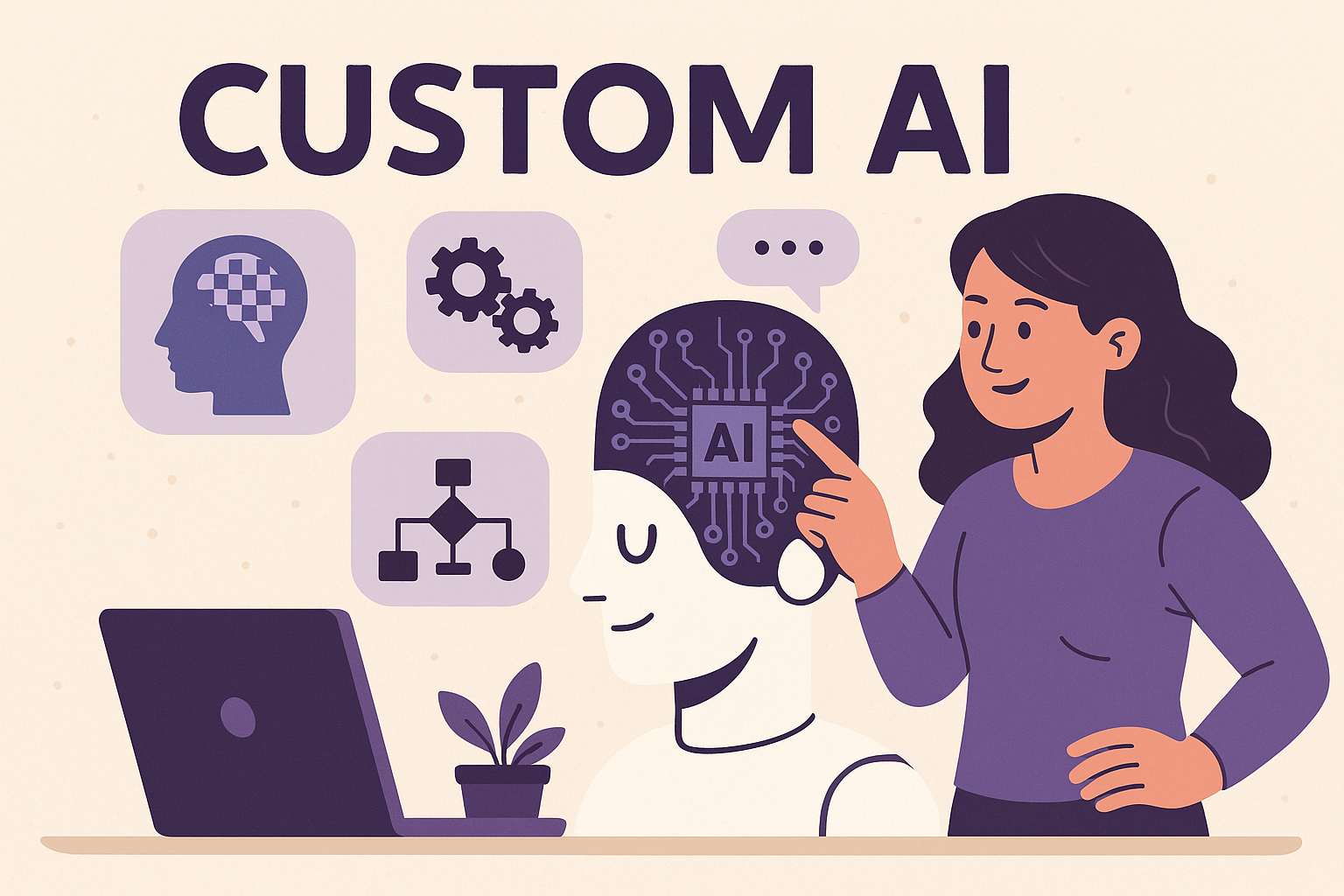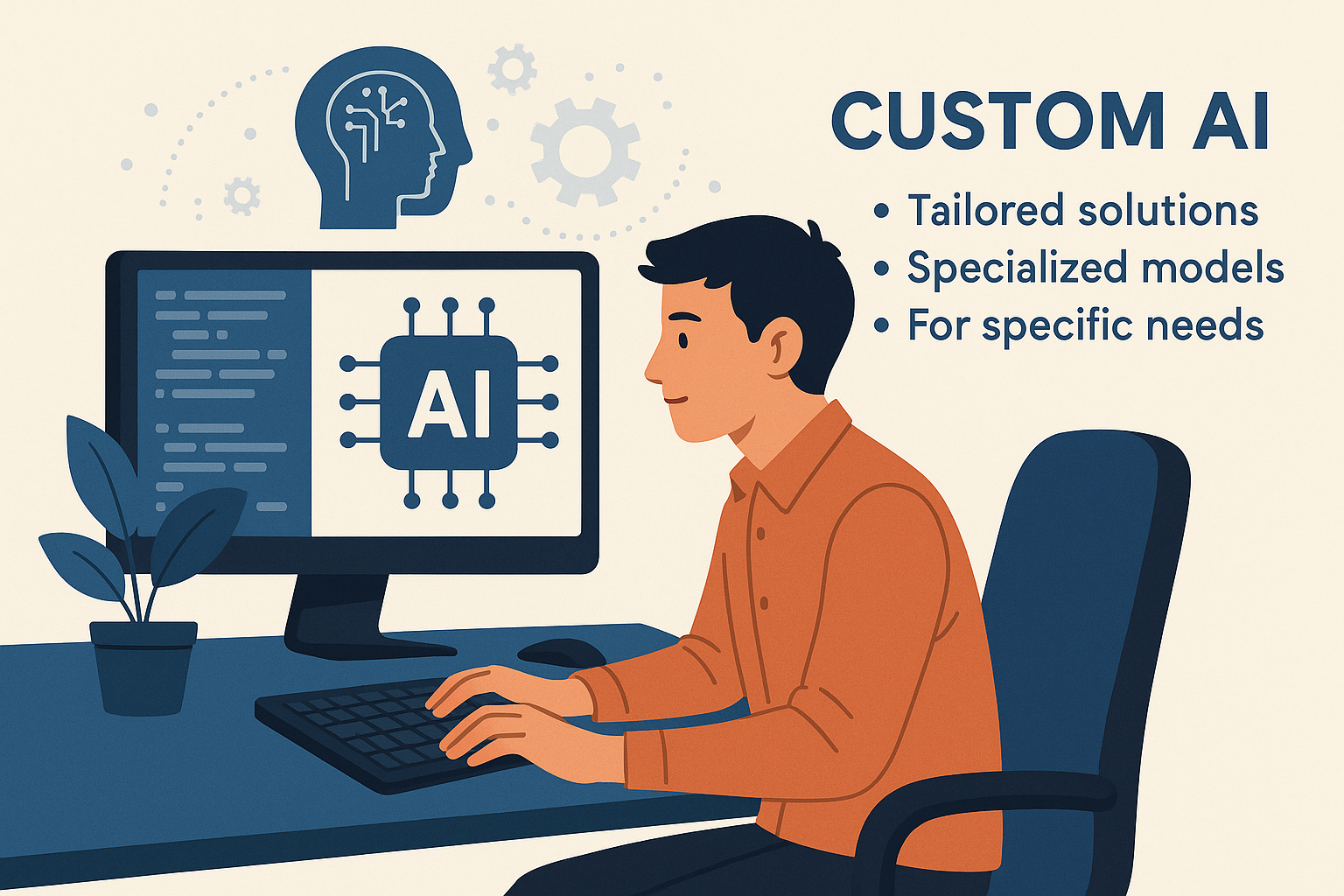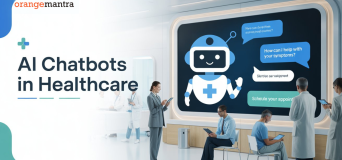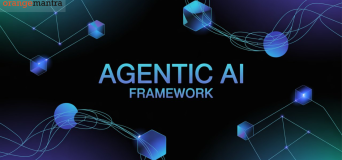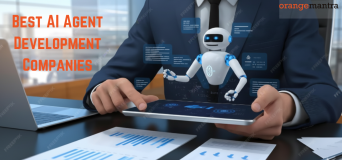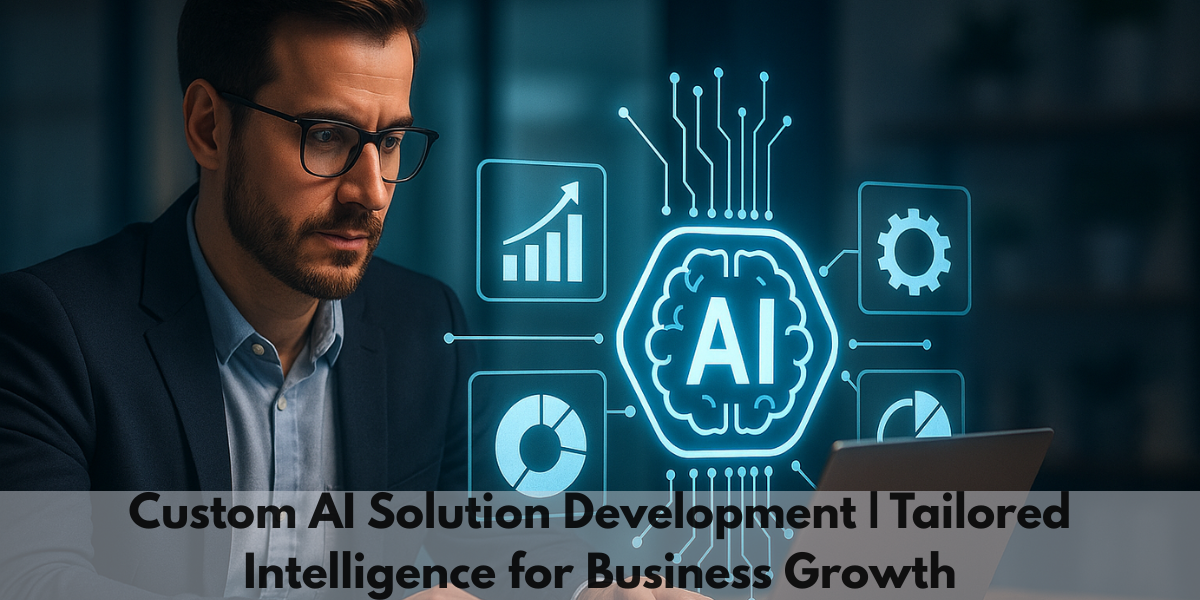
Generic AI tools can’t help businesses grow anymore. The future is custom AI—built for your data, goals, and customers. It boosts efficiency, personalization, and control while scaling with your business. In short, don’t just use AI, own it.
Honestly, if you notice, a business can’t thrive in any way if they are still relying on generic AI tools. It’s because they are not innovating but simply keeping up.
It’s a hyper-competitive market; personalization isn’t just a perk, but it’s the price of entry. Every serious business is tapping into AI now, but the ones pulling ahead? You will see that they’re not settling for plug-and-play tools. They’re investing in custom AI solution development that’s tailored to their data, goals, and customer experience.
Table of Contents
Looking to Build a Custom AI Solution?
Create AI powered solutions tailored to your business goals, workflows, and data for measurable impact.
It’s time you stop using generic AI, as custom solutions are the key. This isn’t just about using AI. It’s about owning it.
Off-the-shelf AI Isn’t Built for Your Business Anymore!
Off-the-shelf AI tools are mass-produced suits; no doubt, they technically fit, but they don’t do much for your style or performance. Wondering why? Just like the traditional approach, they are built with the mindset of “one-size-fits-all”. That playbook is outdated.
Generic AI is made for the masses. But your business isn’t generic. Want sharper forecasting? Hyper-personalized marketing? Smarter workflows? Then you need AI trained on your data, built for your needs, and aligned with your internal operations.
That’s the power of custom AI solution development—AI that fits like a glove and performs like a machine.
The Competitive Advantage of Custom AI
Here’s what you unlock when you go custom:
Aligned With Business Objectives
Custom AI solutions are designed around your exact processes, KPIs, and long-term goals—not someone else’s templates. And the proof is in the performance they deliver.
Intelligent Data Usage
Your data is one of your most valuable assets. A custom solution digs into your CRM, ERP, sales records, and customer interactions to generate real-time, actionable insights.
Brand-Specific Automation
When you implement a custom generative AI app solution, you’re not just automating tasks, but you’re keeping your brand voice consistent, whether it’s through customer support, product content, or internal communication.
Control and Compliance
Privacy matters more than ever. Custom AI keeps your data in your ecosystem, offering full control over how it’s stored, used, and shared—especially important for regulated industries like finance, healthcare, or education.
Scalable and Future-Proof Architecture
As your business evolves, your AI can scale with you. Add features, plug into new systems, or integrate emerging technologies like IoT or blockchain. Custom AI makes it seamless and possible in every way.
What Custom AI Solution Development Is Powering in Today’s Industries
Custom AI isn’t a future promise—it’s already solving big problems across industries. With the right tech stack (think: Python, Hugging Face, OpenAI APIs, MLflow, and more), businesses are automating smarter, predicting better, and personalizing like never before.
| Generic AI | Custom AI Solutions |
|---|---|
| Forces you into preset workflows | Built around your processes |
| Limited to public datasets | Leverages your proprietary data |
| Brand-agnostic outputs | Speaks your brand voice |
| Shared infrastructure | Dedicated secure environment |
Here’s how it’s playing out in the real world:
Retail & Marketing
Tech in play: OpenAI (GPT-4), Pinecone (vector search), Python, Hugging Face
AI is turning browsers into buyers. Custom models trained on CRM and user behavior data now power real-time product recommendations and personalized campaigns. NLP tools from Hugging Face generate brand-consistent email copy, while GPT-based chatbots guide users and reduce bounce rates. Vector databases like Pinecone enable smarter product discovery via semantic search, boosting UX and conversions.
Logistics & Supply Chain
Tech in play: TensorFlow, MLflow, Python, AWS SageMaker
Custom AI models predict shipping delays using historical logistics data and real-time traffic feeds. TensorFlow powers route optimization and demand forecasting, while MLflow tracks model performance and versioning. These AI pipelines integrate with existing ERP systems to automate stock reordering and vehicle maintenance alerts, cutting operational costs and delays.
Education
Tech in play: Hugging Face Transformers, Streamlight dashboards, Scikit-learn
EdTech platforms now deliver adaptive learning paths using classification models trained in Scikit-learn. NLP models from Hugging Face analyze student submissions for sentiment and comprehension. With Streamlit or Gradio, educators access AI-powered dashboards to monitor learning gaps, generate real-time feedback, and improve engagement—without extra admin workload.
Human Resources
Tech in play: OpenAI Embedding APIs, Python, MLflow, LangChain
Custom AI models trained on past hiring data and resumes help identify top candidates faster. GPT-based resume screeners summarize CVs and compare them against role-specific skills using embeddings. MLflow helps HR teams test, tune, and deploy these models securely, while LangChain adds intelligent workflows to onboarding and training portals—turning hiring from reactive to predictive.
These aren’t theoretical use cases, they’re live in production, backed by a solid AI pipeline and deployed via APIs and dashboards. If your business still runs on guesswork, custom AI solution development is how you move from manual to magical.
A Simple Guide to Implementing a Custom AI Solution
You don’t need a huge internal AI team to get started. Here’s a simplified roadmap:
Identify the Right Use Case
Start where AI can bring the most impact—customer service, lead generation, marketing automation, operations, or reporting.
Organize and Prepare Your Data
Your AI will only be as effective as the data it’s trained on. Collect clean, relevant, structured internal data.
Partner With Custom AI Solution Developers
Don’t try to do it all yourself. There is nothing wrong with getting help. You can collaborate with experienced custom AI solution developers who understand tech and your business requirements. They’ll help you go from idea to execution efficiently.
Pilot, Learn, and Scale
Run a pilot. Measure its performance. Learn what works. Then scale it across departments or geographies.
Tech That Solves, Not Just Shines
Here’s a peek at the tech stack that can be used—and it also shows how it fixes problems you don’t have time for:
- Python: Data all over the place? Python handles it in shape and powers everything from analysis to prediction.
- Hugging Face: Tired of your chatbot sounding like a confused robot? but this tool is trained to actually get your tone, your brand, and your customers.
- OpenAI APIs (GPT-4, Whisper): With this, your content won’t take too long or sound off-brand because OpenAI helps you generate spot-on copy, summaries, or chats—in seconds, not hours.
- MLflow: Can’t tell which model is working? MLflow keeps tabs on experiments so you can scale what performs—and ditch what flops.
- Vector Databases (Pinecone, FAISS, Weaviate): These databases give your AI long-term memory for smarter search, recommendations, and instant context recall.
- Streamlit & Gradio: Waiting for developers to tweak every dashboard? These tools help spin up internal AI tools and UIs without dragging in front-end teams.
The above-mentioned aren’t just cool names; they work behind-the-scenes solving issues like poor personalization, inefficient ops, lost data insights, and marketing waste.
Here’s how a custom AI pipeline works —step by step:
- Step 1: Data In
Pull from CRM, ERP, chats, or wherever the good stuff lives.
- Step 2: Clean & Prep
Python libraries like Pandas and NumPy clean it up and get it AI-ready.
- Step 3: Train the Model
Use pre-trained models (like Hugging Face or OpenAI) or build custom ones with Scikit-learn or TensorFlow.
- Step 4: Track & Test
Tools like MLflow keep track of what’s working, what’s not, and what’s worth scaling.
- Step 5: Plug into Systems
Deploy the model into existing apps, dashboards, or workflows—API-ready.
- Step 6: Monitor & Improve
Keep the model fresh with new data, feedback loops, and performance tuning.
| Function | Tools | Business Impact |
|---|---|---|
| Data Prep | Python, Pandas | Clean, structured inputs |
| Model Building | Hugging Face, TensorFlow | Industry-specific intelligence |
| Workflow Orchestration | LangChain, MLflow | Automated business processes |
| Deployment | FastAPI, Docker | Secure integration |
| UI/Reporting | Streamlight, Tableau | Actionable insights |
The Big Win?
An AI setup that’s clean, smart, scalable, and built around the way the business runs!
Smarter Marketing Starts with Custom AI
Marketing is where AI shows some of its most powerful ROI. If you build a custom AI marketing solution, you’re able to:
- Deliver personalized content in real-time
- Predict and score leads more accurately.
- Reduce ad spend waste.
- Anticipate trends and customer behavior using real, first-party data
In short: You market smarter, faster, and more profitably.
Custom Generative AI That Speaks Your Brand
There’s a difference between a chatbot that sounds robotic and one that feels human.
A custom generative AI solution app ensures your AI understands your brand tone, product info, and customer base. It can:
- Draft product descriptions in your style.
- Generate marketing emails that match your tone.
- Power a chatbot that actually helps—not frustrates—your customers.
It’s your brand’s voice, automated and scaled.
Custom AI for Education: Building Smarter Classrooms
Education isn’t a one-size-fits-all industry, either. That’s why more platforms are turning to custom AI solution providers for education to improve student outcomes and reduce manual overhead.
Use cases include:
- Personalized learning content
- Real-time feedback and grading
- Early identification of learning challenges
- Smart scheduling and administration tools
The result? Better learning experiences for students and more efficiency for educators.
Final Thoughts: The Smarter, Custom Way Forward
Generic AI might give you a taste of what’s possible, but only custom AI solution development delivers on the full promise of what AI can do for your business.
Whether you’re looking to build a custom AI marketing solution, explore automation through a custom generative AI app solution, or partner with custom AI solution developers for enterprise or education—going custom is the key to performance, efficiency, and long-term growth.
FAQ
Q1. How much does custom AI development cost?
Pilots start at $50K (focused use case). Enterprise solutions range from $150K-$500K+ with 200-400% ROI typically achieved within 12 months.
Q2. How long does implementation take?
Proof-of-concept: 8-12 weeks. Full deployment: 4-9 months. We recommend agile sprints with measurable milestones every 2 weeks.
Q3. Can custom AI integrate with legacy systems?
Yes. We specialize in connecting AI with SAP, Oracle, Salesforce, and proprietary systems via secure APIs and middleware.
